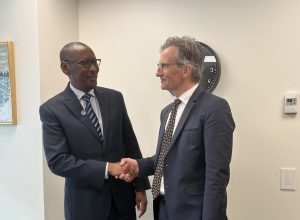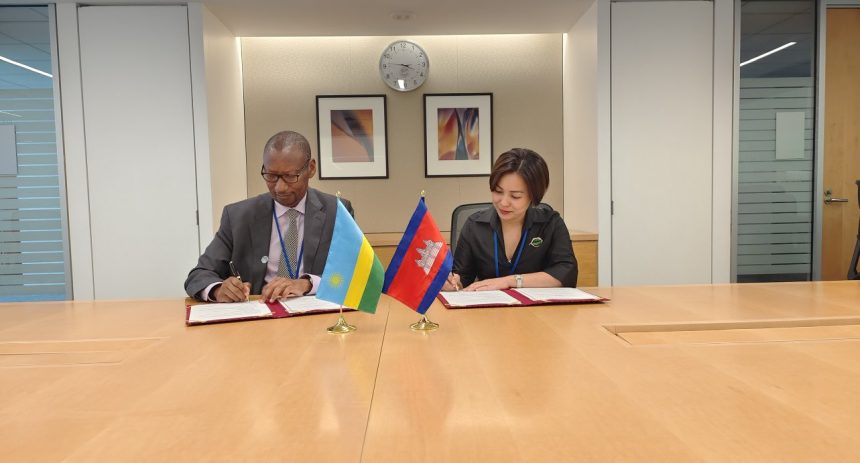The Central Bank of Rwanda and the National Bank of Cambodia have signed a memorandum of understanding aiamed at strengthening bilateral ties and cooperation between the two banks.
The MoU was signed yesterday on the sidelines of the IMF Spring Meetings in Washington, USA, between Governor John Rwangombwa of Rwanda and Deputy Governor of Cambodia Serey Chea.
The MoU will also enhance innovations in digital payment systems, harmonization of regulations to promote more efficient and secured cross-border payments, financial inclusion and market conduct.
The two Governors expressed a mutual desire to support financial service providers in developing financial technology innovations and where necessary participate in joint innovation, digital payments projects in banking and payment.
Meanwhile, Rwangombwa also met the Governor of the Swedish central bank (Riksbank), Erik Thedéen, and held discussions. He congratulated him on his appointment.
The meeting focused on the continued collaboration between the two Central Banks, highlighting the completed training phases by Riksbank staff and deliberating on more planned training sessions.
The Riksbank supports Rwanda’s Central in areas of monetary policy, market operations, financial stability and policy communication.
Lengthy discussions at the week-long summit, where bankers, econmists, and other experts, are exploring issues affecting global economies on interest rates, public debt, and what anthropologists can teach economists.
A robust recovery of the global economy remains elusive as a rapid transition to higher interest rates exposes financial vulnerabilities, the IMF’s Managing Director said on Monday.
Speaking to World Bank President David Malpass, Kristalina Georgieva said that the global economy’s slow pace of projected growth over the next five years posed particular challenges for the world’s poorest countries.
A ”dangerous divergence” has opened between the prospects of developing and emerging-market economies, with average incomes in low-income countries’ growing too slowly to converge with those of middle-income countries, she said.
HOW TO TACKLE SOARING PUBLIC DEBT
Governments can reduce debt with well-timed and well-designed adjustments to fiscal policy, but countries in distress need a more comprehensive approach, acckrding to IMF economists.
A sharp rise in interest rates and the strong US dollar are adding to the costs of servicing public debt, which soared to record highs during the pandemic, topping global gross domestic product.
An analytical chapter of the World Economic Outlook explores what policies work best to durably reduce debt relative to GDP.
Economists say that a fiscal contraction of about 0.4 percentage point of GDP—the average size in their sample—lowers the debt ratio by 0.7 percentage point in the first year and up to 2.1 percentage points after five years.
INTEREST RATES RISES LIKELY TO BE TEMPORARY
As inflation is brought back under control, advanced economies’ central banks are likely to reverse recent rises in interest rates, but how far depends on the persistence of public debt and the extent of financial fragmentation, experts say.
Since the mid-1980s, real interest rates across advanced economies have been steadily declining, most likely reflecting a decline in the natural rate, or the real interest rate that would keep inflation at target and the economy operating at full employment—neither expansionary nor contractionary.
The latest World Economic Outlook explores the forces that have driven the natural rate in the past and the most likely future path for real interest rates in advanced and emerging market economies.
More discussions focused on International Monetary and Financial Committee, the economic outlook for Africa and for Europe, central banks and inflation, and more.
On the final day of the IMF Spring Meetings, we discuss the International Monetary and Financial Committee meeting, the economic outlook for Africa and for Europe, central banks and inflation, and more. https://t.co/h0D3iWxaVg pic.twitter.com/i3ndjB4l4Q
— IMF (@IMFNews) April 14, 2023








